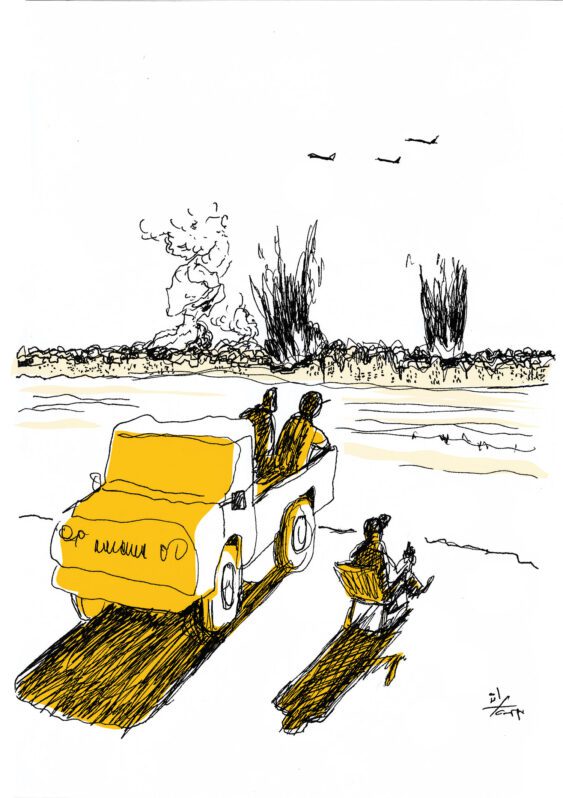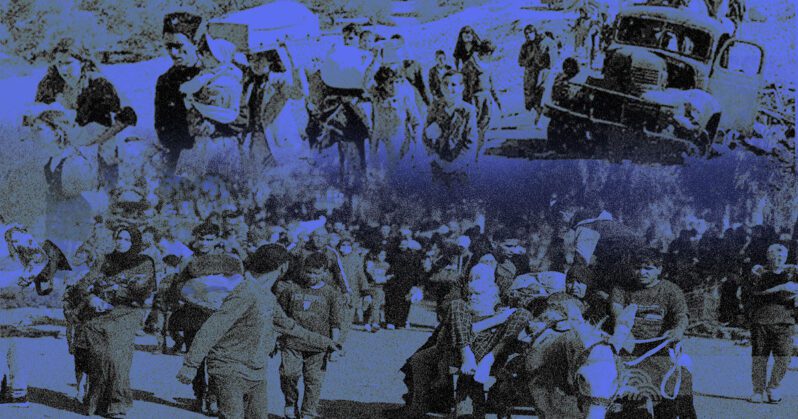Statelessness in Mauritania: A Brief Account of a Long History of Discrimination

The general population and housing census conducted between March 25 and April 8, 2013 found that Mauritania has a population of 3,537,368. Youth constitute 50.7% of the population, women constitute 51%, and nomadic Bedouins constitute 1.09%. Twenty-seven percent of the population inhabits the capital Nouakchott, and the population growth rate is 2.77%, according to the Office of National Statistics. It is estimated that White Moors constitute 30% of the population, while Haratin people (former slaves) constitute 40%, and the Hassaniya dialect unites these two groups. The third population group consists of black Africans of the Soninke, Fula, and Wolof tribes and constitutes 30%. The vast majority of Mauritanian citizens are Muslims, a factor that has led to gradual unity and integration, and helped Arabize high culture. In pre-modern times, Mauritania was known by numerous names: Bilad al-Mulathameen (the land of the Mulathameen or ‘scarfed people’), Bilad al-Sanhaja (the land of the Sanhaja), Bilad al-Tukulor (the land of the Tukulor), Western Sudan, and al-Mankib al-Barzakhi (the isthmian highland). The modern name Mauritania was first given in 1843 by the French officer Jean Francois Caille. This diverse ethnic and historical background reflected by the aforementioned names led, in the past, to religious harmony. In modern times and from this background, a series of essentially ethnic frictions emerged largely as a result of French colonialism. These frictions deepened as the modern state arose after the country gained independence on November 28, 1960.
During the colonial period, the French relied fundamentally on the White Moor ethnic group to administer the political process. However, after independence, larger groups from the recently independent state of Senegal and its neighboring African states moved into southern Mauritania, from which they had been expelled centuries earlier by the raids conducted by warrior groups of White Moors. Perhaps the first sign of friction in recently independent Mauritania appeared in 1966, when an ethnic crisis occurred in the sphere of students and workers. This crisis manifested as a cultural and linguistic conflict, but it was fundamentally the result of discontent about the perceived injustice and marginalization that began with the infiltration into the Mauritanian administration.
The state of mutual polarization, influenced by the dominance of Arab nationalism, fed the first of the ethnic coups attempted by members of the black population, which occurred in 1987. The regime sold this incident as an ethnic attempt to seize power and succeeded in stopping it by executing its leaders. It also imprisoned some of the civilians affiliated with the African Liberation Forces of Mauritania movement (FLAM), whom the state at the time saw as connected to the people attempting the coup, in the Walata prison located 1,212 kilometers from the capital.
The ethnic and racial composition of Mauritania and the aforementioned state of polarization were indisputably a reason for the outbreak of the internal conflict in Mauritania, which this time led to the forced expulsion of Mauritanian citizens. In April 1989, the Mauritanian government retracted the citizenship of 50,000 to 75,000 “black Mauritanians” and expelled them from the country. Those who were expelled became stateless.
This disaster was neglected during the years that followed it. The cleansings that occurred in 1991 and 1992 within the army and the citizenry, which principally targeted black people, were also overlooked. Furthermore, the historical pardon granted by Law No. 23/93 of June 14, 1993, for acts committed by armed forces and security forces personnel between January 1, 1989, and April 18, 1992, ended the victims’ hopes of having the perpetrators held legally accountable.
Thereafter, the strong activism of the political and legal forces in Mauritania, supported internationally, led to the resolution of the lingering humanitarian issues and the issue of exiled persons. The latter interests us because of its connection to our subject matter.
The Mauritanian authorities have taken clear steps to rectify the situation concerning exiled persons. In January 2008, it established a ministerial committee charged with the repatriation of the refugees.[1] In June of the same year,[2] the committees charged with overseeing the repatriation of the refugees in Senegal and Mali and permanently integrating them into the national community, as well as coordinating all processes relating to this repatriation and integration, were appointed. The primary committees concerned are the National Committee for Guidance and Consultation and the National Identification Committee. To this end, the government also established a special agency to support and integrate the refugees,[3] which was entrusted with settling this issue with international partners.
Returning from Exile
Regarding the refugees’ return, there has been distinguished activity on the part of civil society and the international human rights committees, including the African Commission on Human and Peoples' Rights. In its reports, this commission concluded that the treatment of black Mauritanians between 1982 and 1992 constituted a violation of a number of rights that are guaranteed within the African regional rights framework. In May 2000, the commission went so far as to declare that “there were grave or massive violations of human rights as proclaimed in the African Charter”.[4] In addition to the aforementioned activity, there has been a strong national movement to denounce the events of the 1980s.
As a result of all of these factors:
The government was forced to acknowledge its role in the unresolved humanitarian issues, establish compensatory measures for the victims and their families, and attempt to close these cases for good;
The repatriation of black Mauritanian exiles to Mauritania was arranged. Note, however, that around 30,000 of them returned on their own accord between 1994 and 1997, although they had difficulty finding work and reclaiming the freedom to access land and identity documents.[5] As a result of these difficulties, a number of them were forced to once again leave the country;
Following the 2005 coup against President Maaouya Ould Sid'Ahmed Taya, Mauritania was subjected to more political pressure to address past violations of human rights. The issue was once again put on the discussion table during the consultation days organized by the interim authorities (the [Military] Council for Justice and Democracy). This was an opportunity to address and resolve the revocation of nationality and expulsion that occurred from 1989 to 1990; and
On November 12, 2007, the governments of Senegal and Mauritania and the Office of the United Nations High Commissioner for Human Rights (OHCHR) reached an agreement that established the principles that repatriation should be voluntary, family unity should be maintained, and repatriation should occur in safe and dignified conditions; and, within a framework that makes the return sustainable. Mauritania pledged to guarantee a safe and honorable return, to help returnees fully integrate into life in the country, and to provide protection for their property. The repatriation program began at that time. The processes were stalled by the coup in August 2008 and then resumed in 2009. They stalled again in December 2010 before resuming in November 2011. They continued until March 2012, when the OHCHR deemed the program “complete”, having repatriated 24,000 people to Mauritania and hence implemented the aforementioned official agreement. The agreement had also encompassed the exiles’ acquisition of certificates of return from the OHCHR. In principle, these documents enable them to obtain national ID cards and recover their birth certificates.[6]
Obstacles to Obtaining Mauritanian Nationality
Despite this agreement and the measures taken, statelessness and the inability to obtain identity documents remain a problem today and have featured prominently in UN reports about human rights in Mauritania.[7]
Although the country has acknowledged and does acknowledge returnees as citizens, obtaining corroborating civil documents is difficult considering the processes that people lacking ID cards must follow to obtain nationality certificates. Moreover, ID cards, even for people who have been able to obtain them, do not guarantee access to all of the rights associated with Mauritanian citizenship in the same manner that nationality certificates do. For example, a person taking the public service exams must present their nationality certificate in order to comply with article 6 of the public service law, which stipulates that “No person may become a [state] official unless he is of Mauritanian nationality”. Obtaining a nationality certificate requires the presentation of the birth or death certificate of the relatives of the person concerned, as well as their identity card. Most of them do not possess [valid copies of] these documents, either because they were lost during the deportations or due to the abundance of mistakes that these documents, when present, contain.
Recent Developments
In April 2011, the government established a legal framework for a new process of entering the names of inhabitants into the National Population and Secure Document Register. On the basis of Decree No. 110 of 2011, issued on April 12, 2011, registration occurs via the conversion of all civil documents into secure biometric documents. For this purpose, Decree No. 150 of 2010, issued on July 6, 2010, established the National Agency of the Population Register and Secure Documents. Despite the importance of this process, it has struck legislative obstacles and stringent technical measures that, it is feared, may render a number of Mauritanians stateless.
One of the most important of these obstacles is Law No. 3 of 2011, issued on January 12, 2011. This law contains no interim mechanism that enables people to overcome the orthographic errors in names and dates of birth that pervade old civil status documents, including the certificates of return and other statistical documents based on the 1998 census. This has prevented many citizens from obtaining the ready-made ID cards due to the requirement to present their cryptic national identification number, which only people who have been included in the ongoing registration process possess. Consequently, obtaining an ID in this case presupposes that the parents of the person concerned have obtained this national identification number.
These cases have forced people to resort to the judiciary to correct those errors or issue documents corroborating civil status (birth, marriage, divorce, and death). Obtaining these corrections took many legal proceedings, and many of the [new] documents contained errors in the names and dates of birth that required another court intervention to correct. Despite this, the aforementioned law totally forbade corrections to the year of birth, which is another oversight demonstrating that insufficient consideration was given to obvious errors that occurred in the past.
This process prompted fear that it would be used to deprive large numbers of Mauritanians of identity documents, and hence nationality. This has in fact occurred: much of the population still lack birth IDs and hence remain stateless. These frustrations have been exacerbated by the methodology of the registration process, and the fact that no unified mechanism of registration (the process differs from one registration center to another, and from one region to another) has been developed, as well as the difficulty of obtaining corroborating court decisions. They have also been exacerbated by discrimination on the basis of skin color, language, ethnicity, and the occasional excessive financial costs (registration centers are located in populated areas and absent from the most vulnerable areas).
This has caused black Africans to hold protests bearing the slogan ‘Hands off my nationality’. These protests aim to highlight the concern that registration in the population register is being used to exclude them from [owning] identification.
On the other hand, the Mauritanian nationality law treats men and women equally with regards to granting original nationality to a child born to a Mauritanian father or mother on Mauritanian soil (article 8). The law also grants the right to choose nationality in the year before the age of legal competence is reached to a child born outside the country to a Mauritanian mother and foreign father (article 13).
The state also revised the nationality law by issuing Law 23 of 2010 on February 11, 2010. This revision allowed for the incorporation of some important stipulations, including one that permits dual citizenship on the basis of a ‘retention license’ issued by the president (article 31). Dual citizenship was prohibited in the amended law, which had put many black exiles at risk of losing their Mauritanian nationality merely because they had obtained citizenship in another country. Nevertheless, the nationality law still prohibits the naturalization of persons who are not of sound body or mind (article 19), making this segment of the population stateless and vulnerable. Similarly, the conditions of ‘integrity’ [istiqama] and ‘commendable morals’ remain loose and unverifiable.
While the reforms made by the legislature in 2010 were important, absent proof-of-identity documents will remain a great obstacle to the acquisition of nationality, without which persons lacking these documents have no citizenship rights. This calls for an urgent, true review of the situation.
Recently, in November 2015, one such person attempted to register himself in order to obtain an ID. Although his parents are registered, he was refused because he has no document proving his identity. When he approached the judiciary, the judge refused to issue a court decision corroborating his ancestry on the pretext that he must first provide a statement from the registration center. Upon returning to the center, the center’s head refused to hand over the preliminary statement and advised him to go to the place where his father was born to register. When he went to that location, which is far from the capital, he was again refused, this time on the basis that he had not lived in Mauritania for 9 years. As this person comes from a marginal family, he will remain without an ID and therefore stateless. His story sums up the issue.
This article is an edited translation from Arabic.
__________
[1] Decree No. 4 of 2008 (January 18, 2008) stipulates the establishment of a ministerial committee charged with the refugees’ repatriation.
[2] Decree No. 120 of 2008 (June 26, 2008) amends some of the arrangements of Decree No. 4 of 2008 (January 8, 2008), which established a ministerial committee charged with the repatriation of Mauritanian refugees.
[3] Decree No. 164 of 2009 (May 3, 2009) amends Decree No. 11 of 2008 (January 30, 2008), which included the establishment of an administrative institution named …
[4] See: African Commission on Human and Peoples' Rights, Malawi African Association v. Mauritania, communications numbered 54/91, 61/91, 98/93, 164/97–196/97, and 210/98, May 11, 2000.
[5] Bronwen Manby, Struggles for Citizenship in Africa, Zed Book, 2009, Chapter “Mass denationalisation and expulsion”.
[6] The Mauritanian Human Rights Association has worked with the OHCHR to help convey the documents since 2008. The OHCHR has stated that all of those repatriated in accordance with the Tripartite Agreement have registered and are waiting to obtain birth certificates. In 2011, 11,181 of 20,484 returnees had obtained these certificates.
[7] Report of the UN Human Rights Council’s Special Rapporteur on contemporary forms of racism, racial discrimination, xenophobia and related intolerance, from November 2009 for the year 2008. The rapporteur visited Mauritania from January 20 to 24, 2008, at the government’s invitation.
Mapped through:
Articles, Inequalities, Discrimination and Marginalisation, Other Arab countries
Related Articles



